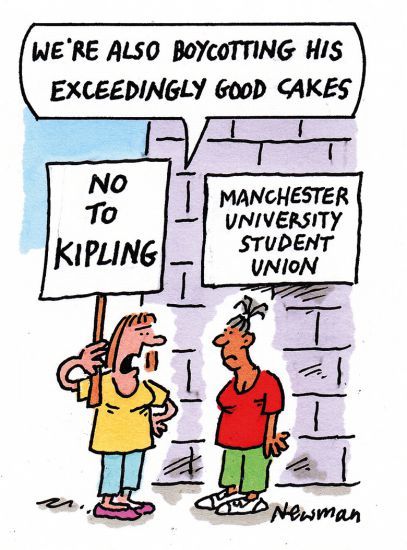
If, as Rudyard Kipling once wrote, you can trust yourself when all (wo)men doubt you, but make allowance for their doubting too, then you might do better than the University of Manchester. The unveiling of a mural in the university’s newly refurbished students’ union building featuring the text of the 19th-century poem did not go down well, with members arguing that Kipling “dehumanised people of colour” and that the decision to feature his words had not been discussed with them. In response, students painted over If, replacing it with the poem Still I Rise, written in 1978 by the US writer and civil rights activist Maya Angelou, The Guardian reported on 19 July. Sara Khan, the union’s liberation and access officer, said that it was “deeply inappropriate” to promote Kipling’s work in the building, which itself is named after anti-apartheid activist Steve Biko. But some linguists dismissed the reaction as “a bit OTT”. “Of course he was a racist. Of course he was an imperialist, but that’s not all he was and it seems to me a pity to say so,” said one professor.
“Snowflake” students took another hit from the Daily Mail after the University of Bath was discovered to have doled out some controversial advice to academics – stop assuming that your teaching is having an effect. According to guidance given during a meeting of the university’s equality and diversity network, lecturers should avoid using the phrase “as you know” because it risks making students feel inadequate. As you know, there are two sides to every story, although not always in the Mail’s reporting of it. The meeting had been held to focus on the attainment gap between white and non-white students, and the suggestion for best use of language was offered in response to an unnamed student’s complaint that assumptions about the level of knowledge among those in a lecture theatre led to self-doubt and made things “difficult to question”.
Staff and students at Langara College in Vancouver have bigger problems to grapple with than lecturers’ slights, so they have welcomed a new online tool to help them in the ongoing fight against their ultimate nemeses – crows. CrowTrax, a website designed to log reports from the ground about attacks from the air, has recorded thousands of anecdotes since its launch in 2016, primarily from scholars complaining of getting “smacked in the head” and even chased across campus by the dive-bombing birds, The Guardian reported. During the spring – peak “crow attack season”, when the feathered residents are especially aggressive in defending their nests – website moderators received as many as 100 reports in six hours. Jim O’Leary, a professor of geographic information systems at the college and co-creator of the tool, said that plotting attacks on a campus map allowed users to find better ways of “defending themselves” by taking alternative routes to class. Sadly, it didn’t work for one student, who recounted: “A crow followed me into the bar and ran off with my girlfriend.”
The principal of Robert Gordon University and his newly appointed deputy failed to declare during the recruitment process that they were co-directors of a firm that owned a multimillion-pound estate in the Republic of Ireland, an inquiry has found. An investigation concluded that Ferdinand von Prondzynski, the principal, and Gordon McConnell, the vice-principal, should have mentioned that they were co-directors of Knockdrin Estates Ltd, a company that owns the von Prondzynski family estate in Ireland, The Times reported. An inquiry led by the university’s governing body found they had breached the university’s conflict-of-interest policy but that it was a “genuine omission or oversight” with no “malicious motive”. Professor von Prondzynski said that the matter was a cause of “deep regret”.
Where once game-show contestants would compete for kitchen appliances, holidays and jet skis, students of the 21st century are jostling for the chance to have their student debt written off on telly. Paid Off, a new quiz show on the US cable channel truTV, capitalises on the dramatic statistic that the country’s graduates have an average debt of more than $37,000 (£28,157). Contestants go through several rounds of trivia, answering questions ranging from “which city legalised the purchase of retail marijuana?” to “what’s the most romantic date you can have for under $10?” One winner, Madeline Pilone, made headline news after winning $28,000, putting a dent in her total student debt level of almost $70,000. With future students in the UK expected to graduate with similar levels of borrowing, could this be the new University Challenge?
Register to continue
Why register?
- Registration is free and only takes a moment
- Once registered, you can read 3 articles a month
- Sign up for our newsletter
Subscribe
Or subscribe for unlimited access to:
- Unlimited access to news, views, insights & reviews
- Digital editions
- Digital access to THE’s university and college rankings analysis
Already registered or a current subscriber? Login




